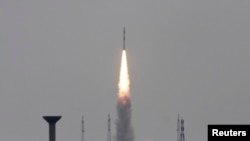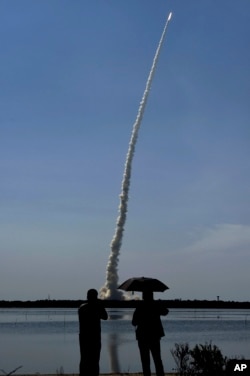India launched 20 satellites in a single mission on Wednesday, taking a major step in its ambitions to win a bigger slice of the lucrative global satellite launch market.
The satellites were carried by one rocket that put them into orbit in 26 minutes. Seventeen were foreign commercial satellites: 13 from the United States, two from Canada and one each from Indonesia and Germany. The rocket was launched from an island in Andhra Pradesh state in southern India.
It was the most satellites India had put in space at one go, though Russia set the record of 37 for a single launch in 2014.
Space analysts said the event would bring more attention to the satellite-launching capabilities of India’s low-cost space program.
Ajay Lele, a senior fellow at New Delhi’s Institute for Defense Studies and Analysis, said Wednesday’s launch demonstrated that “even in developed countries like the U.S., where launching facilities are available, they are looking at India as … a cost-effective as well as a reliable option.”
One of India’s customers on Wednesday was a Google-owned company, for which it launched a 110-kilogram satellite capable of taking sub-meter resolution images and high-definition video.
Growth business
Putting satellites into orbit has emerged as a multibillion-dollar business as Internet and phone companies, airlines and many others seek bandwidth for communication.
“Nowadays, what is happening is that smaller countries in the world, even private players, are keen to have their own satellites,” Lele said. “They can't afford big satellites, so they are looking at nano satellites. India is essentially offering that sort of option now.”
India has launched 74 satellites for foreign vendors, mostly small spacecraft weighing under two tons. Space analysts say India is looking at sharing the technology with private companies so its scientists can focus on space exploration.
Wednesday’s launch doubled India’s 2008 record of putting 10 satellites in orbit in one launch. That was outdone by the United States, which launched 29 satellites in one mission in 2013, and by Russia, which put 33 in orbit in 2014.
Coup for Indian space scientists
Still, it was a proud moment for Indian space scientists, whose most high-profile achievement is an unmanned mission that is currently orbiting Mars. Indian Space Research Organization Chairman A.S. Kiran Kumar said the launch of 20 satellites in a single payload was like “allowing birds to fly in space.”
Indian Prime Minister Narendra Modi praised scientists for continuing to break new barriers. He said in a tweet, "Our space program has time and again shown the transformative potential of science & technology in people's lives."
Besides commercial satellites for foreign companies, the launch also put in orbit India's own earth observation satellite and two to provide service for amateur radio operators.
In the coming months, India also hopes to enter an elite group of countries that have their own global positioning system in place with a series of satellites it has put in space.





